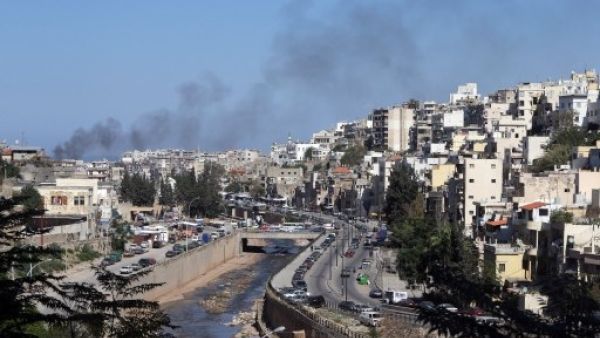The Lebanese Army reinforced its presence in Tripoli Sunday as six people, including a military sergeant, were killed in sniper fire over the weekend, raising the death toll in seven days of fighting between supporters and opponents of Syrian President Bashar Assad to at least 16 and over 80 wounded.
The Army began taking measures, including the setting up of checkpoints and mounting patrols between the warring parties, as preparations were underway to implement a new security plan to restore calm to Tripoli, ravaged by sectarian fighting linked to the 31-month war in Syria.
Sniper fire over the weekend claimed the lives of six people – Moussa Ahmad al-Masri, Muhieddine Abdel-Latif, Omar Abbas, Mohammad al-Jundi, Abu Mariam al-Zaqzouq, Mohammed al-About and Youssef Kamal, an Army sergeant, security sources said.
Except for the Army sergeant, the victims hailed from Jabal Mohsen and Bab al-Tabbaneh, the two rival neighborhoods that have fought one another with increasing frequency since the uprising in Syria began more than two and a half years ago.
Although clashes in the city subsided overnight, sniper fire and the exchange of rocket-propelled grenades picked up during the day and after sunset on Syria Street and the al-Barranieh, al-Baqqar and Jabal Mohsen neighborhoods, the sources said.
Gunfire also accompanied funeral processions for the victims of the recent violence.
The Army deployed heavily in the city in the morning hours as Rifaat Eid, the head of the Jabal Mohsen-based Arab Democratic Party, urged his fighters to withdraw completely.
Army units completed their deployment in Jabal Mohsen in preparation for a wider deployment in the surrounding areas, the state-run National News Agency reported. It said that the deployment was the first step of a security plan to be implemented between Jabal Mohsen and Bab al-Tabbaaneh and throughout the city.
Army checkpoints were established along Syria Street, the line that divides the warring Jabal Mohsen and Bab al-Tabbaneh neighborhoods, where most of the fighting takes place.
The streets of Tripoli remained empty Sunday and shops in the city were closed for business.
The latest round of clashes between the predominantly Sunni neighborhood of Bab al-Tabbaneh, which supports the uprising in Syria, and the mostly Alawite Jabal Mohsen, which backs President Bashar Assad, broke out Oct. 21 after the Syrian leader appeared in a television interview.
The fighting comes weeks after the Internal Security Forces’ Information Branch arrested several people on charges of involvement in the Aug. 23 twin bombings outside two mosques in the city that killed 47 people and wounded over 500. One of the suspects was a resident of Jabal Mohsen and has links to the ADP.Caretaker Prime Minister Najib Mikati held a series of political and security meetings in Beirut to follow up on the situation in Tripoli, a statement from his office said. Mikati stressed that the priority was to end the fighting and restore calm to the city.
For his part, Hariri accused the Syrian regime of inciting violence in Tripoli, saying Damascus was seeking to punish the northern city.
Hariri also held the Lebanese government fully responsible for “abandoning” the city, saying the state should restore stability “or it will be an accomplice in the war that the Syrian regime has launched.”
“Yes, the Syrian regime has decided to launch a dirty war on Tripoli and its residents via its local tools,” Hariri said in a statement issued by his office Saturday.
“Just because the Internal Security Forces’ Information Branch succeeded in discovering the terrorist network responsible for the Tripoli bombings, the order was issued to punish Tripoli and drag its residents into a fight against each other,” he added.
“The head of all crimes in Damascus is the mastermind of all crimes and he is the one who seeks to plunge the city into armed chaos [and] overpower its residents with militias which are being armed by local sides known by the state and its agencies,” he said.
Hariri also criticized the high-level security meeting convened by President Michel Sleiman in Baabda last week for failing to restore calm to the city.
“Is it acceptable for the Lebanese Army with its elite units to become a false witness in the war against Tripoli? Is it right for security agencies and local officials to monitor the situation and announce their inability to confront the dangers in the city?” asked Hariri, the head of the Future Movement.
“As for us, we will not be silent toward the injustice in Tripoli ... We hold the state with all its official, security and military agencies fully responsible for abandoning the city and its residents and leaving it an arena for such armed chaos,” he said.
Former Tripoli MP Misbah al-Ahdab lashed out at Mikati and the city’s lawmakers, accusing them of failing to restore security to Tripoli.
“With the scene of terror [facing Tripoli], we ask what have the prime minister, ministers and lawmakers of the city done [to end the battles]?” Ahdab asked during a news conference at his Tripoli residence.
“They held meetings and gatherings and launched stances and statements, and as usual, the decisions of their meetings remain secret and they just declare that political cover should be lifted from fighters,” he said.
He also said Mikati was not to be trusted, citing what he said were the caretaker prime minister’s links to the regime in Damascus.
“Can you trust a prime minister who is a friend of Bashar Assad who considers Jabal Mohsen a district of Syria and when no [Lebanese] official dares object to [Assad’s] statements?” Ahdab added.
By Antoine Amrieh








